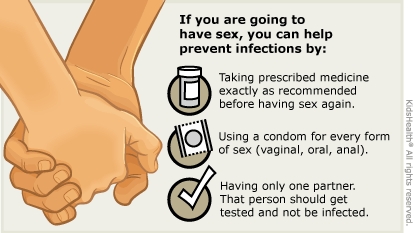At today's visit, you found out that you have trichomoniasis (often called "trich"). Trich is a sexually transmitted disease (STD). STDs are infections that spread through sex (vaginal, oral, or anal). If it's not treated, trich can lead to long-lasting medical problems. It also can be spread to others, even if there are no signs of infection.


Treatment:
Follow up:



What can happen if trich is not treated?
Girls who don't get treatment for trich are more likely to:
Guys who don't get treatment for trich are more likely to:
How can I avoid getting another STD? The best way to avoid an STD is not to have sex (vaginal, oral, or anal). If you do have sex: